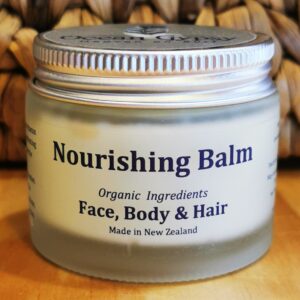After-Dinner Mint Rooibos Aid Digestion & the Nervous System (Caffeine Free)
$14.00
This After-Dinner Mint Rooibos taste like a chocolate mint biscuit without the calories. Combining Madagascar Vanilla Rooibos Tea and Organic Peppermint Tea to make the most divine after-dinner tea. Excellent as a digestive aid because peppermint has a calming effect of the digestive system. Rooibos tea has traditionally been used for indigestion and stomach cramps. Do not consume beverages with meal wait for half an hour after a meal, this is so stomach acid is not diluted reducing digestive function.
Ingredients; Madagascar Vanilla Rooibos and Organic Peppermint Tea
10 in stock
Description
Step into a realm of exquisite flavour and mindful indulgence with our After-Dinner Mint Rooibos, an enchanting blend that captures the essence of a chocolate mint biscuit with the combination of Madagascar Vanilla Rooibos Tea and Organic Peppermint Tea.
As the day winds down, treat yourself to a cup of pure delight that not only gratifies your palate but also eases digestion; the soothing touch of peppermint and the time-honoured benefits of Rooibos unite to create a post-meal ritual that’s as calming as it is delicious. To fully embrace its potency, we invite you to wait thirty minutes after your meal, ensuring the digestive fire of your stomach acid is not diluted. Elevate your evenings, one sip at a time.
Ingredients; Madagascar Vanilla Rooibos and Organic Peppermint Tea
60g Bag which is home compostable packaging using paper & natureflex made from corn.
Rooibos tea, also known as red bush tea, is a popular herbal beverage that is made from the leaves of the Aspalathus linearis plant native to South Africa. It has gained recognition for its potential health benefits, and some of these benefits include
Benefits of Rooibos Tea
- Rich in Antioxidants: Rooibos tea is loaded with antioxidants, including aspalathin and nothofagin, which help combat oxidative stress and protect cells from damage caused by free radicals. Antioxidants are known to have various health benefits and may play a role in reducing the risk of chronic diseases.
- Caffeine-Free: Rooibos tea is naturally caffeine-free, making it a suitable choice for individuals who want to avoid caffeine or are sensitive to its effects. This also means it can be enjoyed at any time of the day without concerns about disrupting sleep or causing caffeine-related side effects.
- Anti-Inflammatory Properties: Some studies suggest that rooibos tea may possess anti-inflammatory properties, which could be beneficial for individuals dealing with inflammatory conditions such as arthritis. The antioxidants in rooibos may help alleviate inflammation and contribute to overall joint health.
- Digestive Health: Rooibos tea has been traditionally used to alleviate digestive issues, such as indigestion and stomach cramps. Its potential to promote a healthy digestive system might be attributed to its anti-spasmodic properties.
- Heart Health: Preliminary research indicates that rooibos tea may have a positive impact on heart health by helping to lower blood pressure and improve cholesterol levels. However, more studies are needed to fully understand its effects on cardiovascular health.
- Skin Benefits: The antioxidants in rooibos tea, along with its anti-inflammatory properties, may contribute to healthy skin. Some skincare products also incorporate rooibos extract due to its potential to soothe skin conditions like eczema and acne.
- Hydration: Like other herbal teas, rooibos tea is a hydrating beverage that can contribute to overall fluid intake. Staying properly hydrated is essential for various bodily functions and general well-being.
- Allergy Relief: Some individuals use rooibos tea to alleviate allergy symptoms due to its potential anti-allergic properties. It might help reduce histamine reactions in the body, although more research is needed in this area.
- Diabetes Management: Some studies suggest that rooibos tea might help regulate blood sugar levels, making it potentially beneficial for individuals with diabetes. However, more research is needed to confirm its effectiveness in this regard.
- Antispasmodic Properties: Rooibos tea has been traditionally used to relieve colicky or infantile spasms in babies. Its anti-spasmodic properties might help relax muscles and provide relief from discomfort.
Peppermint tea is a popular herbal beverage made from the leaves of the peppermint plant (Mentha × piperita). It is known for its refreshing flavor and aroma, and it also offers several potential health benefits:
- Digestive Health: Peppermint tea is well-known for its ability to soothe digestive discomfort. It can help relax the muscles of the gastrointestinal tract, which may alleviate symptoms of indigestion, bloating, gas, and abdominal discomfort. It’s particularly helpful in relieving symptoms of irritable bowel syndrome (IBS).
- Relief from Nausea: Peppermint tea may help ease nausea and vomiting. The menthol in peppermint has a calming effect on the stomach muscles, which can contribute to reducing feelings of nausea.
- Respiratory Relief: The menthol content in peppermint has a natural decongestant and soothing effect on the respiratory system. Drinking peppermint tea can help relieve symptoms of congestion, sinus discomfort, and mild respiratory issues.
- Pain Relief: Peppermint tea might have analgesic properties that can help reduce mild headaches and muscle pain.
- Mental Alertness: The aroma of peppermint tea can have an invigorating effect on the mind and increase alertness. Some people find that sipping on peppermint tea can help them feel more awake and focused.
- Antioxidant Properties: Peppermint tea contains antioxidants, including vitamins A and C, which can help combat oxidative stress and protect cells from damage caused by free radicals.
- Stress and Anxiety Reduction: The aroma of peppermint has been associated with relaxation and stress reduction. Drinking peppermint tea or inhaling its aroma may have a soothing effect on the mind and help alleviate mild anxiety.
- Improved Sleep: Peppermint tea’s relaxing properties might contribute to better sleep quality. It can help relax the body and mind, making it a calming beverage to enjoy before bedtime.
- Antibacterial and Antiviral Properties: Peppermint contains compounds that possess antibacterial and antiviral properties. Drinking peppermint tea may help support the immune system and reduce the risk of minor infections.
- Weight Management: Some studies suggest that the aroma of peppermint may help reduce appetite and cravings, potentially aiding in weight management efforts.
- Oral Health: Peppermint tea’s antimicrobial properties can contribute to oral health by helping to inhibit the growth of harmful bacteria in the mouth. It’s often used as a natural breath freshener.
- Skin Health: Applying cooled peppermint tea topically or using it in a facial steam may help soothe irritated skin and reduce redness. Its anti-inflammatory properties can be beneficial for skin health.
Disclamier; Remember that individual responses to tea can vary, and excessive consumption might lead to side effects in some individuals. It’s generally recommended to consult with a healthcare professional before incorporating herbal teas into your diet, especially if you have specific health conditions or are taking medications.



